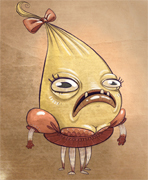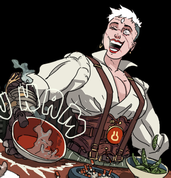|
BravestOfTheLamps posted:I personally just zone out whenever I see the word "trope". Same here. Also taupe, but that's because it's a boring color.
|
|
|
|

|
| # ? Jun 9, 2024 23:01 |
|
Solice Kirsk posted:Same here. Also taupe, but that's because it's a boring color. Same but dope, because I don't like my middle name.
|
|
|
|
BravestOfTheLamps posted:As Jivjov described way back, anyone who enjoys Kingkiller actually ignores the text. Like you can't even describe what's entertaining, merely that "things happen" and "you want to find out about things happening". The actual text is almost incidental. To be honest, most literature I read I read for ideas, rather than prose. The prose is terrible, as you've demonstrated. I could easily forgive that.The biggest trouble with Kingkiller is that most of the ideas are also terrible. With that in mind then, here are the two scenes in Kingkiller I thought were interesting- The Chthaeh- A malevolent prophet with no personal ability to affect the world, who must do so only through conversations with others is an idea I haven't seen played with before, but which has a lot of potential. I like this because it colours everything around it, and everything to come in the story, particularly the bits from the framing device. I think this one is pretty well regarded in general. The bandit camp fight- This scene is a payoff to all the discussion in the previous book and a half about the fear that magic instils in almost everybody who isn't magical (Not just "The commoners", but the church, the state and the nobility as well). Previously mages have just been a bunch of middle class university educated people with an unusual skill. Watching magic be used in a fight, where the body of a fallen foe is reduced to a meat puppet and desecrated repeatedly was illuminating. It added context and substance to the fear that is displayed around wizards, making it something more than just a clichéd fear of knowledge. To fight effectively wizards make everybody around them feel less human. And in return they become hated. I've seen almost nobody else mention this scene, but it really worked for me. I'm struggling to think of much else I found noteworthy. I do know that a lot of the attempts at creating interesting ideas fell completely flat for me (The naming lessons, the Lethani)
|
|
|
|
Is there any fear regarding the wizards though? I don't remember. I mean, one would think if they were so feared, the rest of the world would do something about them as opposed to just letting them have their school that's free to access and exit and in an otherwise normal town...
|
|
|
|
|
anilEhilated posted:Is there any fear regarding the wizards though? I don't remember. I mean, one would think if they were so feared, the rest of the world would do something about them as opposed to just letting them have their school that's free to access and exit and in an otherwise normal town... I think this aspect really suffers from Rothfuss not wanting Kvothe to be personally inconvenienced, so everything is very low key. His noble friend is scared of magic- but works with Kvothe anyway. The Maia distrusts mages, but is willing to take one on as his most trusted advisor. The other mercenaries are terrified of magic, but don't end up with any long term rifts with Kvothe over it. It's all just clunky. And directly after the bandit camp scene, it just goes on to a fairly prosaic scene about splitting the loot? It would have really made the scene crackle if the mercenary gang had ended up turning on him or abandoning him out of fear of his witchcraft. Instead it goes from one of the most visceral moments back to the humdrum, then on to the next setpiece (Kvothe in sexland). And yes, as you've pointed out in a world where people in all strata of society hate or fear mages it doesn't make a lot of sense that the University exists as depicted.
|
|
|
|
Undead Hippo posted:
Bravest pointed out that there's a mention of a cliched Inquisition investigating people for witchcraft and heresy in the city where Kvothe was running around as a street urchin, but that city is like a day away from a university where magicians are running around all over the place with no apparent restrictions. Of course there's no mention of the inquisition after that one time where they show up.
|
|
|
|
It certainly lends more credibility to the theory that these books are a series of disjointed short stories that Rothfuss has poorly attempted to stitch together. Elements like that pop up and then vanish all the time. Very little actually ties the entire books together aside from Kvothe himself being constantly extraordinary and dazzling everyone around him.
|
|
|
|
Grenrow posted:Bravest pointed out that there's a mention of a cliched Inquisition investigating people for witchcraft and heresy in the city where Kvothe was running around as a street urchin, but that city is like a day away from a university where magicians are running around all over the place with no apparent restrictions. Of course there's no mention of the inquisition after that one time where they show up. Rothfuss has literal Sovereign (religious) Citizen rules in Kingkiller. Know the right phrases, or in this case language? Well then normal laws and courts don't apply to you.
|
|
|
|
Evil Fluffy posted:Rothfuss has literal Sovereign (religious) Citizen rules in Kingkiller. Know the right phrases, or in this case language? Well then normal laws and courts don't apply to you. From what I remember, that's just the story Old Cobb heard, and the actual version was a few weeks of boring trial with various professors coming to speak in Kvothe's defense. We do see multiple times that if you know the right people, the normal laws and courts don't apply to you. Which is hardly unrealistic -- though the ease with which Kvothe acquires this aid from high places is. That being said. Malfeasance. Intuitively you might think malfeasance refers to creepy blood/body magic like Kvothe pulls during the bandit camp fight, or Ambrose uses to attack Kvothe through his blood. But the actual definition is much more broad: using magic in any way to harm any person is considered malfeasance. When Kvothe knocks Ambrose over with a gust of wind at the end of the first book, a blow perhaps as strong as a solid punch, he is "expelled" for malfeasance. And yet strangely, despite such a broad definition, malfeasance is virtually unheard of. Kvothe's trial is described as the first like it anyone can remember. People who fear magicians are looked down on by our narrator, and by extension by our author, as ignorant superstitious rubes who don't realize how unthinkable malfeasance is. And yet strangely, despite being so unthinkable, malfeasance doesn't seem unthinkable at all. Kvothe's "expulsion" for for such an unthinkable act is dismissed as a matter of routine course; sure, it was an accident, but it carries the same charge as the freaky blood magic he does later. The University teaches students to fight each other in magical duels, an act which outside of the classroom would be malfeasance. When Kvothe is confronted with people he wants to fight -- not a rampaging army of demons, but mere highwaymen who didn't even attack him -- he immediately turns to the most awful form of malfeasance without a second thought. The folk hero Taborlin the Great seems to make use of what we would now call malfeasance. And yet strangely, despite practicing malfeasance frequently, Kvothe never once thinks of the laws against malfeasance as unrealistic or wrong. He views fear of malfeasance as foolish because malfeasance is rare, not because malfeasance is terrifying and wrong. He does not question why killing someone in self-defense is acceptable with a sword but forbidden with a fireball. He just tacitly agrees that this is the case -- and then kills someone with a fireball anyhow. Outside of his artificery, malfeasance is perhaps Kvothe's primary use of magic. And yet strangely, despite this being the most immediate and obvious use of magic, nobody except Kvothe seems to realize how obvious it is. Caudicus, a University graduate whose profession is assassin, does not commit malfeasance. Most aggressive uses of magic would be undetectable -- if you fight someone in the woods, knock them over with a wind blast, and then stab them, what evidence of your crime exists? If you kill someone with a sympathy effigy doll and then burn the body to hide the exact damage done, how could anyone tell the difference between this and a mundane killing? And yet, Kvothe assures us, most magicians would do no such thing, which makes Kvothe a brilliant prodigy for noticing, unlike everyone else, that bodies look like bodies and that super powers can be used to hit stuff. And yet strangely, despite no malfeasance seeming to exist in the world outside of Kvothe, there is an inquisition tasked with hunting down and stamping out the malfeasance that, Kvothe constantly reassures us, isn't actually being committed by anyone else. The inquisitors never leave the one city in which they are based, and view their inquisition as a full-time job. One wonders how they can find so many instances of malfeasance to keep themselves busy And yet strangely, despite the inquisition being dedicated to locating malfeasance, it's not clear how they could even if it existed. A bandit lies dead in the woods, a sword run through the chest after being knocked to the ground -- but was the bandit shoved physically, or knocked off-balance by wind? A body is found burned beyond recognition; was the fire set on the living victim by magic, or simply applied manually after a mundane killing? An old person dies of a heart attack -- but is it natural causes? The inquisition is investigating something that, if done with even a trivial amount of effort, cannot be investigated by the level of forensic and medical science available in the setting. And yet strangely, even the blatant act of malfeasance that was the chandrian attack at the end of the first book seems to draw no attention from the inquisitors, from the University, or indeed from anyone except Kvothe. While hiding malfeasance is easy, perhaps not hiding malfeasance is even easier. And yet strangely, despite malfeasance-hunting being woefully shoddy, there is apparently no underground market for unstoppable sympathy-assassins, despite literal kings having no defense against them. And yet strangely, despite what literal kings having no defense against malfeasance would normally imply about the rarity of magic in the setting, a massive magic university teaches magic to thousands of students drawn from all over the world. And yet strangely, we are meant to cheer Kvothe's malfeasance against Ambrose, then cheer Elodin protecting Kvothe from punishment for this malfeasance because he didn't know what he was doing, then boo Ambrose as he uses malfeasance against Kvothe, then cheer Kvothe as he beats the malfeasance charges laid against him at trial, then cheer Kvothe again as he knowingly, intentionally, repeatedly commits malfeasance, then cheer the Maer as he decides not to punish Kvothe for committing the worst act of magic imaginable in a land where magic is feared. Malfeasance is a paradox because Rothfuss stitched his world together out of several disparate short stories and D&D modules, placing each detail as a discrete object without the slightest thought to how they might interact. What is malfeasance to Kvothe and his world? It's a last resort, it's a first resort, it's horrific, it's mundane, it's ingenious, it's obvious, it's used by nobody, it's taught to every student, it's a superstitious fear of the common peasantry, it's the sensible fear of the wise man, it's hunted, it's unhuntable, it's not worth hunting, there's nothing to hunt in the first place. And yet strangely, people say one of the greatest strengths of this series is its worldbuilding.
|
|
|
|
Magical forensic analysis could be the kernel of an entertaining story, if not necessarily a profound one (provided you didn't get too hung up on technical details). But then, one of my favorite characters from the Discworld novels is Cheery Littlebottom ...Wait, I think I'm just imagining Feet of Clay. I need to reread that. To bring us back to the topic, most of Terry Pratchett's novels also leave the Kingkiller Chronicles eating their dust any way you care to compare them, imo
|
|
|
|
Quote is not edit.
|
|
|
|
PJOmega posted:I cannot think of a single Pratchett book, novel, short story, vignette, musing, interview, rambling, incoherent mutter, or ejection of bodily waste that is worse than
|
|
|
|
Evil Fluffy posted:Rothfuss has literal Sovereign (religious) Citizen rules in Kingkiller. Know the right phrases, or in this case language? Well then normal laws and courts don't apply to you. This is almost certainly a reference to a real thing in English law. https://en.wikipedia.org/wiki/Benefit_of_clergy I'd say it was probably a thing in most European nations as well, in some form. Conflicts between the church and secular rulers weren't just an English thing. Yes, this was a super dumb legal mechanism, but early-modern law courts were dysfunctional at the best of times.
|
|
|
|
I'd just like to point out that holding opinions like this is how you lose elections:Rothfuss in Chapter 8 of NOTW posted:It’s hard to be wrongfully accused, but it’s worse when the people looking down on you are clods who have never read a book or traveled more than twenty miles from the place they were born.  e: Also I forgot how bad this was: quote:Now you have to understand that twenty pennies might be a good bit of money for some little ragamuffin troupe living hand-to-mouth. But for us it was simply insulting. He should have offered us forty to play for the evening, free use of the public hall, a good meal, and beds at the inn. The last we would graciously decline, as their beds were no doubt lousy and those in our wagons were not. Remember, if you're discriminated against by some filthy provincial, just invoke the name of your feudal overlord. BravestOfTheLamps fucked around with this message at 12:08 on Nov 17, 2016 |
|
|
|
BravestOfTheLamps posted:I'd just like to point out that holding opinions like this is how you lose elections: Ah, I've been wondering how this happened.
|
|
|
|
Is this Baron Grayfallow mentioned ever again after the Poverty: The Urchin Years?
|
|
|
|
PJOmega posted:Is this Baron Grayfallow mentioned ever again after the Poverty: The Urchin Years? I don't think he's even mentioned during Poverty: The Urchin Years. His name might come up once when Kvothe is looking for a patron, but only to hand-wave away why Kvothe can't ask Baron Greyfallow to be his patron (too far away or something, it was a weak explanation).
|
|
|
|
Patrick Rothfuss's take on the election:Patrick Rothfuss posted:Earlier today, I found myself wondering what Auri would do in this situation. Well… that’s not actually true. Maybe it’s more that I wish I could ask for her advice? I wish she could just… help me. Like maybe she could give me a seashell or something and I would put it in my pocket and then I’d feel a little better. That's certainly one interpretation.
|
|
|
|
Lottery of Babylon posted:I don't think he's even mentioned during Poverty: The Urchin Years. 4 mentions by name in Wise Man's Fear: 1) Noting at the Eolian how Kvothe never appreciated the livery Baron Greyfallow used to give the troupe (two sets of clothing a year). 2) Describing how his father hated being at Baron Greyfallow's call to Denna, in Denna's rooms; 3) Recognizing that even a far away patron can be a good patron, when Threpe says Threpe is looking further away; and 4) Having a set of clothes tailored in Baron Greyfallow's green and grey to attend the party Threpe throws for Kvothe when Kvothe returns to the university.
|
|
|
|
Benson Cunningham posted:Patrick Rothfuss's take on the election: It's okay Rothfuss. Your waifu will always love you, in your heart
|
|
|
|
ulmont posted:4 mentions by name in Wise Man's Fear: Haha, even Kvothe's dad was an ungrateful shitbag. How are they really at this lord's beck and call if they were just wandering around the countryside at random? Seems like they had a pretty sweet deal going: they get money/clothes from this guy and they get to use their connection to him to bully people into giving them more poo poo. Seeing as how everyone else in this world outside of the university or the aristocracy is an illiterate country bumpkin or a Dickensian street urchin, they're doing pretty well.
|
|
|
|
Grenrow posted:Haha, even Kvothe's dad was an ungrateful shitbag. How are they really at this lord's beck and call if they were just wandering around the countryside at random? I may have paraphrased that too hard. Specifically when the troupe was in residence at the Baron's estates, for "a few span" every year, not generally.
|
|
|
|
ulmont posted:I may have paraphrased that too hard. Specifically when the troupe was in residence at the Baron's estates, for "a few span" every year, not generally. Still though, it doesn't make sense given the context of the world. Why would it be be better to wander around the countryside, where you can get murdered by bandits or ancient magical whatevers without any protection vs being set up at a noble's estate, where you have all the food and shelter you need? It's bullshit to complain about actually having to do work for their employer, but then complain when you're outside his estates and the ungrateful peasantry doesn't accommodate you in the same manner that an aristocrat can afford to.
|
|
|
|
Grenrow posted:Still though, it doesn't make sense given the context of the world. Why would it be be better to wander around the countryside, where you can get murdered by bandits or ancient magical whatevers without any protection vs being set up at a noble's estate, where you have all the food and shelter you need? It's bullshit to complain about actually having to do work for their employer, but then complain when you're outside his estates and the ungrateful peasantry doesn't accommodate you in the same manner that an aristocrat can afford to. Kvothe pretty explicitly lays out that his father hated the feeling of being cooped up at the Baron's estate. He was only happy on the road, playing in a different town or three every span. Yeah, protection from bandits and whatnot is fine; but that just wasn't his dad's style.
|
|
|
|
jivjov posted:Kvothe pretty explicitly lays out that his father hated the feeling of being cooped up at the Baron's estate. He was only happy on the road, playing in a different town or three every span. Yeah, protection from bandits and whatnot is fine; but that just wasn't his dad's style. It was absolutely his dad's style. His dad expects and demands premium accommodation wherever he goes because of their connection to their patron. He likes the privilege and power of being employed by someone who is rich, but doesn't like the idea that he has actual responsibilities because of that relationship. I guess it makes sense for Kvothe's dad to be a huge rear end in a top hat too. He had to get it from somewhere.
|
|
|
|
Grenrow posted:It was absolutely his dad's style. His dad expects and demands premium accommodation wherever he goes because of their connection to their patron. He likes the privilege and power of being employed by someone who is rich, but doesn't like the idea that he has actual responsibilities because of that relationship. I guess it makes sense for Kvothe's dad to be a huge rear end in a top hat too. He had to get it from somewhere. He doesn't like being cooped up at the estate at the direct beck and call of Greyfallow. Being on the road and performing (which are, in fact, his responsibilities) is fine with him.
|
|
|
|
Kvothe's mom, too, ran away from the dreary life of a noble to live as a trouper. It's the same as Arliden really hating being at someone's "beck and call" but then bullying people around. They're still privileged twats, they just hate having duties and responsibilities that actually demand sacrifice. It's one way the books' vacuous middle-class liberalism comes through. Rothfuss can barely even imagine duty and responsibility in his art. Even the basic feudal relationship of lord and retainer is ephemeral in this medieval setting (ever notice how there are no knights around except in the distant past?). e: Hell, notice how few families there are around?
BravestOfTheLamps fucked around with this message at 23:54 on Nov 17, 2016 |
|
|
|
BravestOfTheLamps posted:Kvothe's mom, too, ran away from the dreary life of a noble to live as a trouper. It's the same as Arliden really hating being at someone's "beck and call" but then bullying people around. They're still privileged twats, they just hate having duties and responsibilities that actually demand sacrifice. It's one way the books' vacuous middle-class liberalism comes through. Rothfuss can barely even imagine duty and responsibility in his art. Even the basic feudal relationship of lord and retainer is ephemeral in this medieval setting (ever notice how there are no knights around except in the distant past?). e: Hell, notice how few families there are around? There's basically nothing about the political geography of the world at all within the text itself. For all of the talk about "worldbuilding," would you even be able to tell the names of countries from the text? Even the depiction of the nobility, which gets so much attention in the plot and in Kvothe's rantings, is devoid of any specificity whatsoever.
|
|
|
|
There's Vintas because that's where that lovely "only wines from Vintas have a vintage" and the Maer was there? That was Vintas, right? There's also the Commonwealth that has like, an inqusition and Hogwarts but never in twain shall they meet. Uh, then there's ninja land. Ademre or whatever? And wherever Cealdish people come from, I can't loving remember what the country name that is. And then that one ancient empire that failed and the other one that's a tiny collection of hills in the middle of nowhere. I think I'm missing something. Is the Waystone still in the Commonwealth? I didn't think the Commonwealth had a king, but they talk about the king's coin or something. Basically I'm saying none of these were really memorable (except for Ademre, but for the wrong reasons) becase the worldbabbling just gave me a bunch of samey whitepeople countries where one uses rings obsessively and the other is just magic America. I am still really salty that the awesome pirate adventures was loving abridged IN THE TEXT.
|
|
|
|
Grenrow posted:There's basically nothing about the political geography of the world at all within the text itself. For all of the talk about "worldbuilding," would you even be able to tell the names of countries from the text? Even the depiction of the nobility, which gets so much attention in the plot and in Kvothe's rantings, is devoid of any specificity whatsoever. It's a fantasy novel, so you get a map instead. 
|
|
|
|
ulmont posted:It's a fantasy novel, so you get not-Europe instead.
|
|
|
|
I hadn't thought of Georgia as a big wine-making region (xref: Vintas), but apparently I was wrong: http://www.wsj.com/articles/is-the-country-of-georgia-the-next-great-wine-destination-1460045910
|
|
|
ulmont posted:It's a fantasy novel, so you get a map instead. anilEhilated fucked around with this message at 19:14 on Nov 18, 2016 |
|
|
|
|
ulmont posted:It's a fantasy novel, so you get a map instead. Here's a good question: Where is the King? What makes being 20th in line to the King such a big deal? Who's the dominating power on the continent? Why is the sex ninja village like some hidden village from Naruto where they just send out mercenaries to work and bring money back?
|
|
|
|
pentyne posted:Here's a good question: Where is the King? By elimination, the Commonwealth (and, if in the Commonwealth, probably in Tarbean). We have references for the Emperor of Atur, the Kings of Cealdim, the Kings of Vint, and the High King of Modeg, along with a reference to the "Penitent King", who seems likely to be the one that people are in line for (which would also make sense to be the Commonwealth based on the location of the University). quote:"Simmon's father is a paper duke bowing to a tin king in Atur." pentyne posted:What makes being 20th in line to the King such a big deal? Who's the dominating power on the continent? The Commonwealth is the dominating power, with Vintas a second. See above and note also the zillion references to being as rich as the King of Vint. pentyne posted:Why is the sex ninja village like some hidden village from Naruto where they just send out mercenaries to work and bring money back? Places where you learn mysterious martial arts are always hidden.
|
|
|
|
I swear to christ it's like every other criticism in this thread is something that's applicable to like 99% of other fantasy authors, or is directly contradicted by a previous criticism (how do any of these kingdoms/empires make sense please explain to me? but also don't because worldbuilding is haraam)
|
|
|
|
|
"World-building" is just a tool for story-telling. Lud-in-the-Mist is a beautiful and fantastical yet painfully bourgeois city, and this reflects the intertwining of the fantastical and the real. It serves the story. The setting of Kingkiller amounts to names on a map and various props. Rothfuss describes many things that exist in the world, but not what the world is like. This reflects the barrenness of its story. Thus Kingkiller is poorly imagined. BravestOfTheLamps fucked around with this message at 21:01 on Nov 19, 2016 |
|
|
|
pentyne posted:Why is the sex ninja village like some hidden village from Naruto where they just send out mercenaries to work and bring money back? I never thought of that but it's so very accurate. Emperors don't need to be more powerful than kings. The Byzantine Emperors were at some points the most powerful rulers in Christendom; yet even before Constantinople fell, a lot of "lesser" kings were stronger than various of the emperors.
|
|
|
|
Also look at China and Japan for examples of Emperors that didn't really wield as much power as their minor lords.
|
|
|
|

|
| # ? Jun 9, 2024 23:01 |
|
Torrannor posted:I never thought of that but it's so very accurate. Yes, lots of complexity about who truly has power and authority is pretty common in history. Kvothe's "legend" is all about being a "King-killer" and stealing daughters from "barrow Kings" yet literally nothing of substance to make any of those sound notable has been introduced. There's the assumption that Ambrose somehow becomes King and Kvothe murders him for whatever reason (stealing Denna) but even then committing regicide to somehow becoming a powerful and beloved folk tale is a pretty tall order.
|
|
|




























